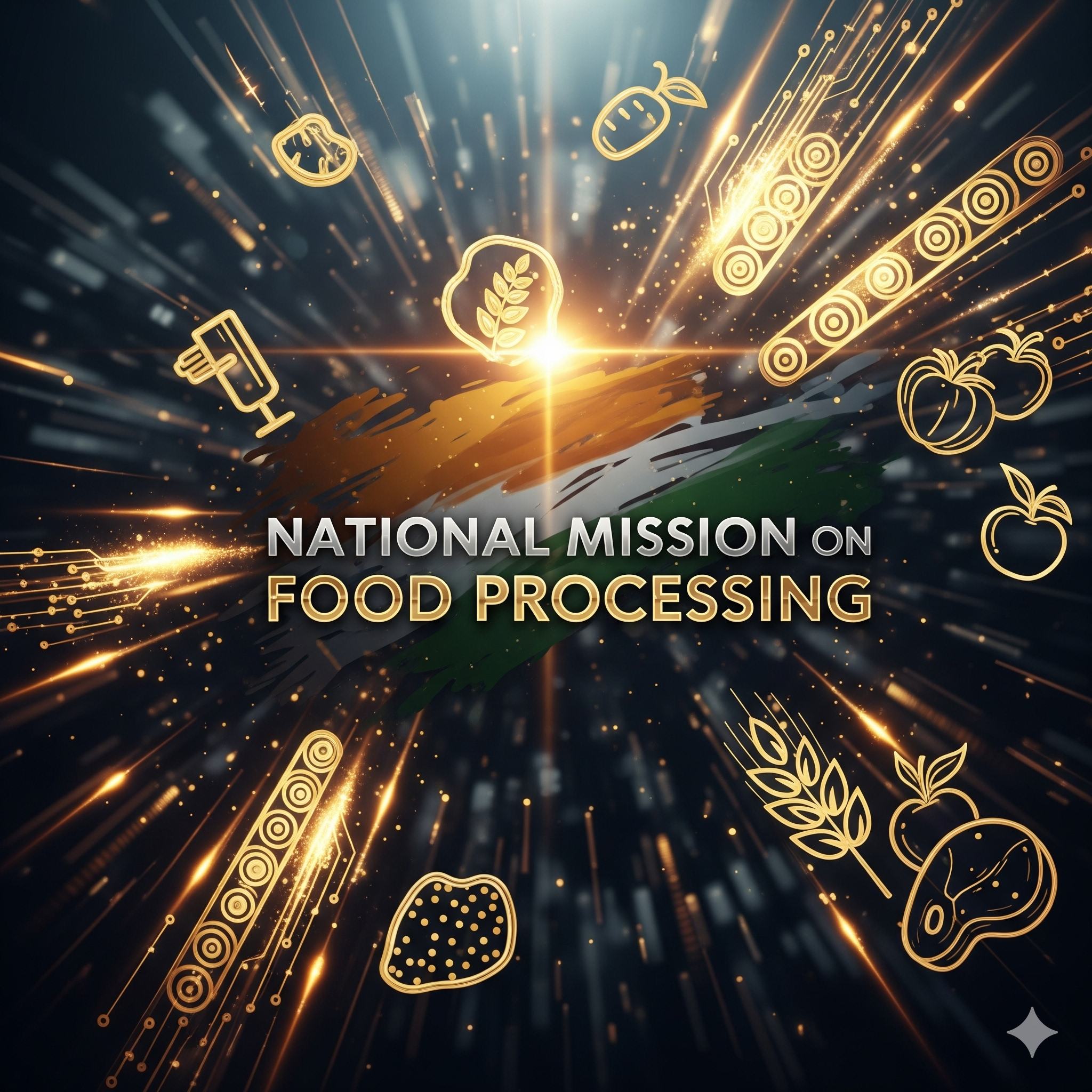Introduction
Food processing plays a pivotal role in India’s agricultural and economic development. India, being an agrarian economy with a large population, produces a diverse range of agricultural commodities, including cereals, fruits, vegetables, milk, meat, and spices. However, a significant portion of produce is lost post-harvest due to poor storage, inadequate processing infrastructure, and lack of modern technology.
To address these challenges and to enhance value addition, reduce wastage, and increase farmers’ income, the Government of India established several initiatives, including the National Mission on Food Processing (NMFP) and the National Food Processing Development Council (NFPCD). These institutions aim to promote sustainable growth of the food processing sector, ensure food security, and generate employment opportunities.
National Mission on Food Processing (NMFP)
1. Background and History
- The Indian food processing sector has immense potential due to the country’s diverse agro-climatic zones and abundant raw material availability.
- In 2007, the Ministry of Food Processing Industries (MoFPI) launched the National Mission on Food Processing (NMFP) as part of the 10th Five Year Plan to strengthen the food processing industry.
- NMFP was designed to integrate efforts under existing schemes and provide a cohesive framework for food processing development.
2. Objectives of NMFP
The primary objectives of the National Mission on Food Processing are:
- Promote Food Processing Industry
- Encourage modernization and expansion of food processing units.
- Support micro, small, and medium enterprises (MSMEs) in the sector.
- Enhance Value Addition
- Increase the share of processed food in the total food output.
- Reduce post-harvest losses of perishables.
- Technology Upgradation
- Facilitate adoption of modern food processing technologies.
- Promote research and development in food preservation and packaging.
- Employment Generation
- Create employment opportunities in rural and semi-urban areas.
- Support entrepreneurship in the food processing sector.
- Food Security
- Develop efficient processing and supply chain infrastructure.
- Improve availability of processed and nutritious food.
- Export Promotion
- Enhance global competitiveness of Indian processed food products.
3. Components and Schemes under NMFP
The National Mission on Food Processing includes several key components and schemes to achieve its objectives:
- Mega Food Parks Scheme
- Establishes food processing clusters with integrated infrastructure.
- Provides common facilities like cold storage, warehousing, packaging, and quality control labs.
- Cold Chain, Value Addition, and Preservation Infrastructure
- Promotes creation of cold storage chains, cold rooms, and refrigerated transport.
- Helps reduce post-harvest losses of perishable commodities.
- Food Safety and Quality Assurance
- Establishes laboratories for testing food quality and safety standards.
- Promotes adherence to FSSAI regulations and ISO standards.
- Technology Upgradation and Modernization
- Offers financial support for machinery upgradation and modern processing technologies.
- Encourages adoption of energy-efficient and automated processing systems.
- Skill Development and Entrepreneurship Support
- Organizes training programs for food technologists, entrepreneurs, and workers.
- Provides incubation support for start-ups in the food processing sector.
- Marketing and Export Promotion
- Assists in brand development, packaging innovation, and marketing strategies.
- Supports participation in international food expos and trade fairs.
4. Implementation Mechanism
- NMFP is implemented by the Ministry of Food Processing Industries (MoFPI) in collaboration with state governments, financial institutions, and private enterprises.
- State-level Food Processing Missions (FPMs) coordinate with NMFP to identify potential clusters, allocate grants, and monitor project execution.
- Central and state government subsidies are provided to eligible projects under various components of NMFP.
5. Achievements and Impact of NMFP
- Infrastructure Development
- Establishment of multiple Mega Food Parks across India.
- Expansion of cold storage and warehousing capacity.
- Reduction of Post-Harvest Losses
- Significant decrease in spoilage of fruits, vegetables, and dairy products.
- Significant decrease in spoilage of fruits, vegetables, and dairy products.
- Employment Generation
- Creation of thousands of jobs in rural and semi-urban areas.
- Creation of thousands of jobs in rural and semi-urban areas.
- Export Growth
- Increase in export of processed foods, ready-to-eat products, and beverages.
- Increase in export of processed foods, ready-to-eat products, and beverages.
- Promotion of Entrepreneurship
- Rise in food processing start-ups and small-scale enterprises.
National Food Processing Development Council (NFPCD)
1. Background and History
- The National Food Processing Development Council (NFPCD) is a non-profit organization established under the aegis of the Ministry of Food Processing Industries (MoFPI).
- The council functions as a policy advisory and promotional body to assist the government, industry, and entrepreneurs in the food processing sector.
- NFPCD plays a pivotal role in bridging the gap between technology, finance, and market access for food processing enterprises.
2. Objectives of NFPCD
The main objectives of NFPCD are:
- Policy Advisory and Support
- Provides recommendations to MoFPI on policies, incentives, and regulatory frameworks.
- Provides recommendations to MoFPI on policies, incentives, and regulatory frameworks.
- Promotion of Food Processing Industry
- Organizes conferences, exhibitions, and workshops to promote industry networking.
- Organizes conferences, exhibitions, and workshops to promote industry networking.
- Capacity Building and Skill Development
- Conducts training programs for entrepreneurs, technicians, and food scientists.
- Conducts training programs for entrepreneurs, technicians, and food scientists.
- Technology Transfer and R&D Support
- Facilitates access to modern food processing technologies and innovation hubs.
- Facilitates access to modern food processing technologies and innovation hubs.
- Market Access and Export Facilitation
- Supports branding, packaging, and international market penetration.
- Supports branding, packaging, and international market penetration.
- Sustainability and Quality Standards
- Promotes adoption of FSSAI, ISO, and HACCP standards for processed foods.
3. Functions of NFPCD
- Research and Development
- Identifies emerging technologies in food processing.
- Collaborates with research institutions and universities for innovation.
- Training and Skill Development
- Develops training modules and certification programs for workers and entrepreneurs.
- Develops training modules and certification programs for workers and entrepreneurs.
- Advisory Services for Industry
- Provides guidance on project feasibility, funding, and regulatory compliance.
- Provides guidance on project feasibility, funding, and regulatory compliance.
- Networking and Industry Collaboration
- Creates platforms for industry, government, and academia to collaborate.
- Creates platforms for industry, government, and academia to collaborate.
- Support for Food Processing Start-ups
- Assists in incubation, mentoring, and market access for new enterprises.
4. Achievements of NFPCD
- Policy Advocacy
- Contributed to reforms in food processing regulations and subsidy policies.
- Contributed to reforms in food processing regulations and subsidy policies.
- Capacity Building
- Trained thousands of entrepreneurs and technical personnel in food processing.
- Trained thousands of entrepreneurs and technical personnel in food processing.
- Technology Dissemination
- Assisted in transferring modern food processing technologies to SMEs.
- Assisted in transferring modern food processing technologies to SMEs.
- Industry Growth
- Promoted establishment of small, medium, and large-scale food processing units.
- Promoted establishment of small, medium, and large-scale food processing units.
- Quality and Standards Compliance
- Encouraged adherence to international quality standards, improving export competitiveness.
Challenges in Food Processing Sector
- Fragmented Supply Chain
- Lack of organized collection, storage, and transport infrastructure.
- Lack of organized collection, storage, and transport infrastructure.
- Limited Access to Finance
- Small-scale farmers and entrepreneurs face difficulty in obtaining credit.
- Small-scale farmers and entrepreneurs face difficulty in obtaining credit.
- Technological Gaps
- Many units use outdated processing methods.
- Many units use outdated processing methods.
- Awareness and Training
- Limited awareness of market opportunities and quality standards among small producers.
- Limited awareness of market opportunities and quality standards among small producers.
- Regulatory Compliance
- Complex licensing, FSSAI, and certification procedures.
Future Prospects
- Integration with Digital Platforms
- Linking food processing units with e-NAM and other digital marketing platforms.
- Linking food processing units with e-NAM and other digital marketing platforms.
- Promotion of Agro-Clusters
- Development of mega food parks and agro-processing hubs.
- Development of mega food parks and agro-processing hubs.
- Sustainable and Eco-Friendly Practices
- Adoption of energy-efficient, water-saving, and waste-reducing technologies.
- Adoption of energy-efficient, water-saving, and waste-reducing technologies.
- Skill Development Programs
- Training programs to produce a technically skilled workforce.
- Training programs to produce a technically skilled workforce.
- Global Competitiveness
- Encouraging export-oriented food processing industries.
- Encouraging export-oriented food processing industries.
- Policy and Financial Support
- Strengthening subsidies, credit facilities, and insurance schemes for entrepreneurs.
Conclusion
The National Mission on Food Processing (NMFP) and the National Food Processing Development Council (NFPCD) are cornerstones of India’s food processing ecosystem. By promoting infrastructure development, technology adoption, skill enhancement, and market access, these initiatives aim to:
- Reduce post-harvest losses.
- Increase value addition.
- Enhance employment opportunities.
- Boost exports of processed food.
- Support small and medium enterprises.
As India moves towards doubling farmers’ income and promoting rural economic growth, NMFP and NFPCD will continue to play a critical role in transforming the food processing sector into a modern, efficient, and globally competitive industry.
With continued investment, innovation, and collaboration among government, industry, and academia, India’s food processing sector can become a major contributor to economic growth, food security, and sustainable development.




